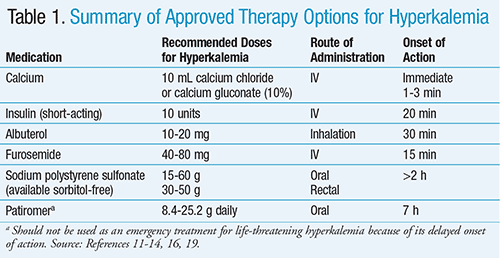You may be advised to make changes to your diet to avoid foods that are high in potassium. Ask your dietitian for a list of high-potassium foods and lower potassium options.
High Potassium Hyperkalemia Causes Prevention Treatment American Kidney Fund Akf
Extremely high potassium levels need immediate treatment.

Elevated potassium treatment. Your blood potassium level is normally 36 to 52 millimoles per liter mmolL. Plan ahead if you know you will be eating a meal that is high in potassium. Doctors usually find high potassium on a blood test.
Treatment may also include using a combination of intravenous insulin plus. Medicines can help lower potassium levels in people who need more than just dietary changes. If your potassium level is very high or if there are dangerous indications such as changes in an electrocardiogram emergency treatment is needed.
That may involve supplying calcium to the body through an IV to treat the effects on muscles and the heart or administering glucose and insulin through an IV to decrease potassium levels long enough to correct the cause. Interestingly most people do not get any symptoms from. This may include removing potassium from your blood with potassium binders diuretics or in severe cases dialysis.
The kidneys regulate the total potassium level in the body and excrete excess amounts in. Treatment options for chronic hyperkalemia include changing medications avoiding NSAIDs and reducing consumption of potassium. Youll receive an IV infusion of calcium to protect your heart.
Increased serum potassium can result from many different conditions such as renal or respiratory dysfunction diabetes bradycardia inadequate adrenal cortex function or metabolic acidosis. Treatment varies depending on the potassium level. Potassium is a chemical that is critical to the function of nerve and muscle cells including those in your heart.
High potassium treatment depends on the severity of the elevation. For example if you are going out for dinner and you know your meal will be higher in potassium or you know that it will be hard to measure how much potassium is in your meal plan to eat meals that are low in potassium for. Hyperkalemia is a condition characterized by high levels of potassium in the blood 55 meqL.
Diarrhea with very high potassium levels. How is hyperkalemia high potassium managed or treated. Treatment for acute hyperkalemia involves stabilzing heart function shifting potassium to the intracellular space using a combination of IV insulin plus glucose to offset hypoglycemia albuterol and sodium bicarbonate and removing potassium with potassium binders diuretics or dialysis.
Salt substitutes containing potassium or excessive intake of potassium can lead to hyperkalemia. The diagnosis is made when levels in the blood are greater than 55 mEqL. Technically hyperkalemia means an abnormally elevated level of potassium in the blood.
This may mean a short stay in hospital to allow your potassium levels to be closely monitored and to start treatment. If you have high potassium due to kidney failure hemodialysis is your best treatment option. Elevated potassium in the bloodstream is called hyperkalemia.
Potassium levels are measured 1 2 4 6 and 24 hours after diagnosis and treatment of hyperkalemia is initiated. When not recognized and treated properly severe hyperkalemia results in a high mortality rate. Extremely high levels of potassium in the blood severe hyperkalemia can lead to cardiac arrest and death.
Stabilizing the cardiac membrane with calcium gluconate The first step in treating high potassium blood levels is to stabilize the cardiac membrane. Having a blood potassium level higher than 60 mmolL can be dangerous and usually requires immediate treatment. You may not have any symptoms unless your blood potassium levels are significantly elevated.
Urgent treatment is usually needed if the potassium levels are above 6. Hemodialysis uses a machine to remove waste from. High potassium medically known as hyperkalemia is a common laboratory finding.
Treatment for hyperkalemia varies based upon the cause of the disorder. Chest pain or heart palpitations. Loop diuretics may also be a.
Very high potassium requires emergency medical treatment. Mildly elevated levels may only require a reduced-potassium diet. Your body gets rid of potassium mainly in urine.
Also called water pills these drugs make you pee more often.
